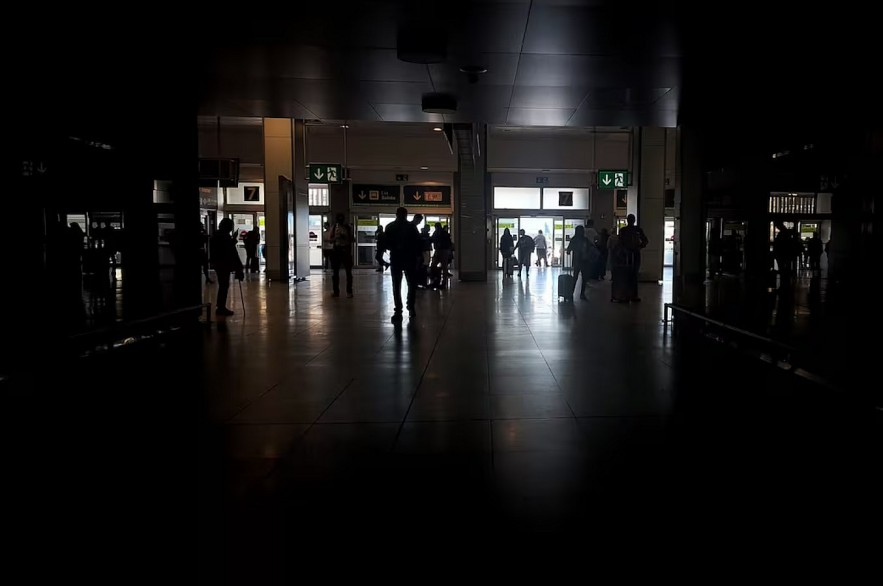Massive Power Outages Sweep Spain, Portugal, and France: Leaves Over 15 Millions In Darkness
In a major disruption to daily life and critical infrastructure, a widespread power outage hit Spain, Portugal, and parts of southern France on April 28, 2025.
Millions were left without electricity, transportation systems ground to a halt, and vital services faced serious interruptions. As Europe grapples with increasing pressure on its aging power grids and shifts to greener energy, this incident exposes deep vulnerabilities.
Barcelona, Seville, and Valencia were plunged into darkness Monday afternoon as authorities rushed to restore critical systems. The blackout also hit Portuguese cities, including Lisbon. Officials indicated the disruption likely stemmed from a fault in Spain’s electricity distribution network.
Here is everything you need to know: the facts, the causes, the consequences, and what comes next.
 |
| Massive power blackout hits Spain and Portuga |
What Happened: The Extent of the Outage
At approximately 12:30 PM local time, massive blackouts cascaded through major metropolitan areas and rural regions alike. Key cities affected included:
-
Spain: Madrid, Barcelona, Valencia, Seville
-
Portugal: Lisbon, Porto, Braga
-
France: Perpignan, Narbonne, Toulouse (partial disruptions)
Immediate consequences:
-
Public transportation (metro, railways) collapsed.
-
Airports experienced delays and grounding of flights.
-
Hospitals shifted to emergency generators.
-
Water treatment plants and ATMs went offline.
-
Telecommunication networks were disrupted.
-
Traffic chaos erupted as signals failed.
Over 15 million people across the Iberian Peninsula were directly impacted.
Panic Grips Spain as ATMs, Transport, and Communications Collapse Amid Power OutageSpain was thrown into chaos as a massive power outage knocked out ATMs, mobile networks, and public transport nationwide. In Madrid, metro passengers like 19-year-old Carlos Condori were stranded mid-journey, while traffic lights blacked out, causing gridlock at major intersections like Cibeles Square. Office workers flooded the streets without internet access, and students were evacuated from smoke-filled buildings. In Barcelona, residents and tourists alike scrambled for information, with public transport suspended and phone coverage down. “Everything is totally out of control,” said 16-year-old student Marina Sierra, reflecting the widespread panic gripping the country. |
 |
| Massive Power Outage Leaves Millions In Spain, Portugal And France In Darkness |
Investigating the Root Causes
Several factors are being considered in ongoing investigations by European energy agencies and national authorities:
1. Climate-Driven System Instability
-
Iberia has been experiencing extreme temperature swings, causing unpredictable electricity demand.
-
High atmospheric pressures may have induced resonance in high-voltage transmission lines, leading to desynchronization across grids.
2. Infrastructure Damage
-
A fire in southwest France reportedly damaged a critical high-voltage line between Perpignan and Narbonne, a key connector between France and Spain.
-
This physical disruption could have triggered cascading failures across interconnected systems.
3. Cybersecurity Concerns
-
Spain’s National Cybersecurity Institute has launched a full probe.
-
Although no direct evidence of a cyberattack has been confirmed, experts caution that vulnerabilities exposed during the blackout could be exploited in future incidents.
| Fears of a potential “Russian cyberattack” are gaining traction, fueled by memories of past assaults on European infrastructure. Portugal’s Ministry of Internal Administration has publicly stated that a cyberattack remains a possible cause under investigation. Meanwhile, Spain’s Cybersecurity Coordination Office urged caution, emphasizing that it is still “far too early” to pinpoint the source of the massive disruption. |
4. Renewable Energy Transition Challenges
-
Heavy reliance on solar and wind energy without sufficient battery storage has made real-time balancing of supply and demand more complex.
-
Sudden drops in solar output due to cloud cover at critical moments may have stressed the system beyond its adaptive capacity.
Rare Atmospheric Phenomenon Triggers Major Power Outage Across Spain, Portugal, and France
A rare atmospheric phenomenon caused a massive power outage across Spain, parts of Portugal, and France on Monday, according to Portugal’s grid operator REN. REN told Sky News that extreme temperature fluctuations in Spain led to “anomalous oscillations” in high-voltage transmission lines — a phenomenon known as “induced atmospheric variation.” This disrupted synchronization across Europe’s interconnected power grids, sparking widespread blackouts.
The complexity of the situation means it could take up to a week for full restoration. Portugal’s national energy supplier E-Redes confirmed the blackout stemmed from a broader European grid fault. Spain’s operator Red Eléctrica said “all resources” are being deployed to resolve the issue. In France, electricity provider RTE reported only a brief disruption, stating power was quickly restored and that efforts are now focused on assisting Spain’s recovery.
 |
| Tourists stranded at train stations as massive power outage hits Spain, Portugal |
Impact Beyond the Immediate
Economic Costs:
-
Early estimates suggest the outage could cost the region over €2 billion in lost productivity, damage to goods (such as perishable foods), and emergency response efforts.
Public Trust:
-
Citizens are raising questions about the reliability of their national infrastructure.
-
Businesses are demanding government action to improve grid resilience.
Political Repercussions:
-
European leaders, including European Commission President Ursula von der Leyen, have called for urgent summits to address the "structural fragility" of continental grids.
-
Spain and Portugal are pressuring the EU for financial support to modernize their networks.
Petrol Stations Shut Down Across Spain and Portugal Amid BlackoutThe widespread power outage forced petrol stations across Spain and Portugal to close, leaving drivers stranded. In Villabona, stations were seen cordoned off, while travelers in Costa Blanca reported that “all petrol stations were closed” in areas like Torrevieja. In Portugal, gas stations also shut down as hospitals and emergency services switched to backup generators, according to the Associated Press. |
Emergency Response and Recovery Efforts
Authorities responded swiftly:
-
Spain’s Red Eléctrica and Portugal's REN activated emergency protocols within minutes.
-
Restoration teams prioritized hospitals, airports, and critical government facilities.
-
Gradual re-energization of the grid began within three hours.
-
By late evening, 70% of affected areas had power restored; full restoration is expected within the next 24-48 hours.
Key challenges to full recovery:
-
Investigating and repairing transmission line damage.
-
Rebalancing regional power loads without overloading sensitive infrastructure.
-
Preparing for potential aftershocks or secondary failures.
Long-Term Solutions and Lessons Learned
1. Grid Modernization
-
Massive investments are needed in smart grid technologies that can detect and isolate faults faster.
-
Building in "grid islands" to contain failures is a critical strategy.
2. Cybersecurity Reinforcement
-
Upgrading cybersecurity protocols to prevent sabotage and malware-based attacks.
-
Routine simulation of cyber-physical attack scenarios.
3. Energy Storage Expansion
-
Accelerating deployment of industrial-scale batteries to buffer intermittent renewable energy sources.
4. Regional Energy Cooperation
-
Strengthening cross-border energy sharing agreements and building more robust interconnectors.
Conclusion
The April 28 blackout is not merely a technical hiccup; it is a warning bell for Europe's energy future. As the continent aggressively transitions to renewables, it must also build the resilience needed to handle the complex demands of a modern energy ecosystem. Governments, industry leaders, and citizens must act swiftly—or risk facing even greater blackouts ahead.
FAQs
1. What caused the massive power outage in Spain, Portugal, and France in 2025?
The outage was likely triggered by a combination of extreme weather, infrastructure damage, and vulnerabilities in Europe’s interconnected energy grids, with investigations also considering potential cybersecurity threats.
2. How many people were affected by the April 2025 power outage?
Over 15 million people across Spain, Portugal, and parts of southern France experienced blackouts, affecting homes, businesses, public transport, and essential services.
3. How long did it take to restore power after the outage?
Partial restoration began within hours, but full recovery across all affected regions was projected to take between 24 to 48 hours, depending on local grid conditions.
4. What are the economic impacts of the Europe-wide power outage?
Early estimates suggest economic losses exceeding €2 billion, covering disruptions to businesses, logistics, and emergency response efforts.
5. What lessons were learned from the 2025 European blackout?
The outage highlighted the urgent need for grid modernization, stronger cybersecurity measures, better energy storage solutions, and more resilient infrastructure to support Europe’s renewable energy transition.
6. How is Europe planning to prevent future large-scale blackouts?
Plans include investing in smart grids, enhancing cross-border energy cooperation, building more robust energy storage systems, and conducting regular cyber-resilience drills.























